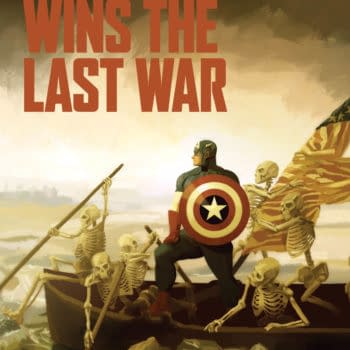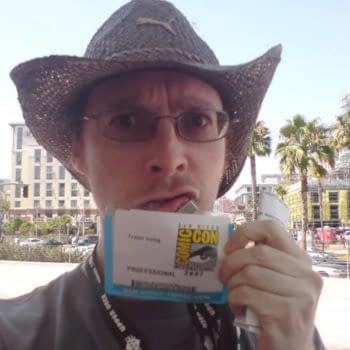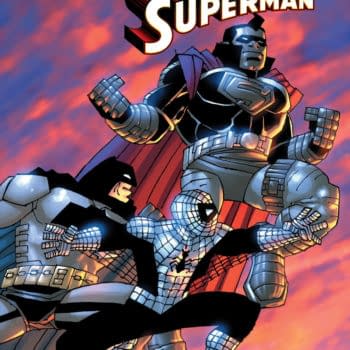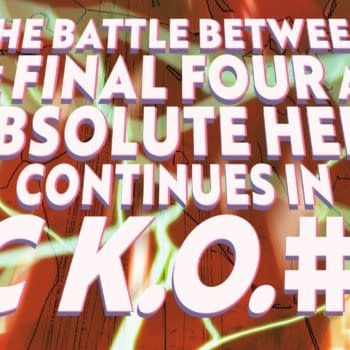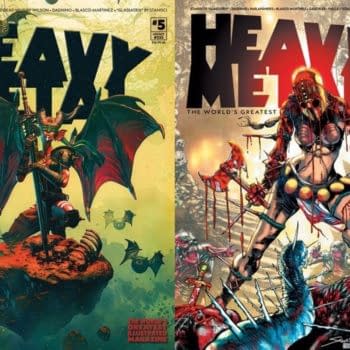Posted in: Comics, Recent Updates | Tagged: Ben Kahn, Bruno Hidalgo, Comics, entertainment, kickstarter, shaman
Mixing Necromancy, Humor And Adventure – Ben Kahn Talks Shaman
By Nikolai Fomich
[Shaman Issue One]
In the world of superhero comics, no one stays dead forever. But who brings the dead back to life? That's the question writer Ben Kahn and illustrator Bruno Hidalgo explore in their new supernatural adventure comic Shaman. With their Kickstarter campaign well underway, I spoke with Ben about the comic, baseball, magic, and the importance of humor in comics.
Nikolai Fomich: Ben, what is Shaman?
Ben Kahn: Shaman is a post-meta supernatural adventure series combining urban fantasy and superheroes. Superheroes and villains are always coming back to life in comics, and in Shaman, it's our hero, the titular Shaman, who actually brings them back. It's written by myself and drawn by Bruno Hidalgo (Once Upon A Time Machine). We're running a Kickstarter to print a collected edition of the first five issues. These stories form a nice arc, but the characters and world we're setting up exist way beyond these five issues. If the book is successful enough, there are tons more Shaman stories to tell.
NF: There's some interesting backstory to this project. As I understand it, you were a customer at Philadelphia's comic shop and small press Locust Moon in its early days, where you discussed your ideas for Shaman with co-owner and creative director Chris Stevens. Talk a bit about your relationship with Locust Moon and how that helped get Shaman to where it is today.
BK: I knew some of the Locust Moon guys before there even was a Locust Moon. [During] my sophomore year at college I got a job in a comic store where I worked with Josh O'Neill, [who] would later co-found Locust Moon. So that was how I first knew those guys.
Then when Locust Moon was between stores, Chris Stevens was still getting comics delivered to his apartment. So every week, I'd take the elevator up to buy my comics. We'd hang out and chat, and over time I told Chris about a script I'd been sitting on. Chris gave me the push to really go after it and get the comic made. He found Bruno, and eventually came on as an editor. He's been there every step of the way. Bottom line, without Locust Moon, there is no Shaman.
NF: How did Bruno get involved and what has working with him been like?
BK: Oh man, working with Bruno is an adventure. Bruno came on at Chris' recommendation. Bruno had drawn a story for Locust Moon's Once Upon A Time Machine, and that was sort of the talent pool we were looking to recruit from for Shaman. Chris saw something in my script and Bruno's art, and he was right on the money. Bruno created a world that was exactly how I envisioned, and more spectacular than I could have imagined.
Bruno's out in Barcelona, so language and distance made regular communication difficult, but man, when it comes to creating Shaman, we're vibing on the same cosmic wavelength or something Morrison-y like that. I love working with Bruno – I give him a blank canvas and he fills it to the brim with details and humor. In issue three, there's a scene in a tattoo parlor. Bruno gives this building so much life and character, when I saw it I wanted to do an entire issue set there. I mean, we blew it up five pages later, but that's comics. I've been very lucky to have in Bruno a true partner in creating Shaman.
NF: Writing about characters using magic is always tricky – rules need to be established and limits maintained, otherwise a character's abilities will make little sense. The magic in Shaman concerns raising the dead, but Shaman himself does not get to decide who gets to come back. That's an interesting concept, and it provides some unusual moral dilemmas. When creating the character of Shaman, why did you decide to focus on necromancy and the problems it causes?
BK: You're right, writing about magic characters is tricky. You have to constantly be aware of the trap of having the right spell suddenly save the day. I've always tried to remember that the pertinent question isn't, "will Shaman win?" because of course he will. His name is the title of the book, of course he'll win. No, what's interesting is, "how will he win?" And if that "how" is simply a different super spell every week, that is a crap story. Shaman's greatest weapon is his mind – that will always be how he wins. His magic is just an extension of that. He doesn't win with ancient relics and powerful spells, but with guile, lies, and trickery.
As for the necromancy itself, that was always the core premise of the story. I love superheroes, and was fascinated by the whole idea of heroes and villains constantly coming back to life. I wanted to kind of personify that concept of resurrection, put a face on it. "What if it was just one guy brining everyone back?" was the question that first kicked the story off in my mind. I started writing Shaman just a few years after Barry Allen came back. If you read issue one, you can see Barry Allen and Wally West served as the basis for the Vanishers.
And yeah, an important part of the set-up is that Shaman doesn't choose who gets brought back. We don't get into it too much early on, but Shaman has a boss. There's someone above him actually deciding who gets a second chance. Taking away that agency from Shaman was necessary for a lot of reasons. If he could decide, that's just too much power for any character to have and still be relatable. Shaman is, at his core, a guy doing a job. He doesn't want to bring back bad people, but he has no problem doing it. He's not blind to the moral dilemmas; he just doesn't care. Whatever his real goal is, he's willing to do some pretty terrible things to see it through.

NF: I found your book's tone refreshing. In issue two, Shaman tells ex-superhero Zachary Wu, the second Vanisher, that he's "still thinking like a superhero, in black and white" and that his world, the world of necromancy, "is all gray." Yet unlike many comics which eschew traditional superhero morality, Shaman is not "grim-and-gritty" – on the contrary, there's as much humor in its pages as occult adventure. Why did you decide to aim for that humorous tone when creating this book?
BK: No disrespect to the dark avengers of the night, but I think grim-and-gritty is less realistic. Have you tried being dour and serious all the time? It's exhausting! No matter what you do, no matter how insane it is, do it long enough and it becomes normal. And you joke about things that are normal. Try being a mysterious badass with a teenage daughter in tow, and see how long it takes for serious and dour to turn silly. And a lot of Shaman's humor is a defense mechanism. He hides his pain behind a wall of sarcasm and snark. So the idea of funny versus serious, it's really a false question. I don't think the two are as mutually exclusive as people think.
NF: As you point out, Shaman is not only a mage but a father as well, and his "foul-mouthed" teenage daughter LL is just as important to the story as he is. Who is LL and what role does she play in the story?
BK: I'm so glad you picked up on LL and how important she is. She's every bit the main character as Shaman is. Above all else, Shaman is fundamentally about two things: the man Shaman is, and the woman LL will become. LL is Shaman's adopted daughter. Shaman has trained her to be a sorceress and she fights with magical tattoos she can bring to life. Shaman and LL are the most important people in each other's lives and have an unbreakable bond. We don't get into the full story in this first volume, but will learn the general details about how they came together.
I came up LL really early on. If Shaman was going to be a magician, I knew he needed a magician's assistant. I also wanted to do my take on a classic hero-sidekick dynamic. Sidekicks have kind of disappeared completely from the Big Two, with the exceptions of maybe Batman and Hawkeye, so this was me writing what I wanted to read. LL is my favorite character to write. She has no filter and is exuberance personified. There's nobody in the world who loves life more than LL. A big part of Shaman will always be her path to adulthood and (relative) maturity.
NF: So tell me Ben, do you really hate the Red Sox so much that you needed to bring Babe Ruth back to life so that he could ensure they'll never win another World Series? Or is saving the world simply more important than baseball?
BK: Haha, oh man, the baseball issue. I had the time of my life writing that issue, so much fun. That was my love letter to the Yankee-Red Sox rivalry. I grew up a die-hard Yankee fan in Southern Connecticut. Every day was Yankee fans swiping at Red Sox fans [and] vice versa. There were Mets fans too, but we mostly just laughed at them. And c'mon! It's my book. Why bother playing God if I can't engage in petty childhood grudges? So take that, Boston! I made a monster tear through your town! Both Shaman and I would agree that screwing over the Red Sox is far more important than saving the world. But if the world gets saved along the way, that's fine and dandy. Now if you'll need me, I'll be in the corner crying over a picture of Derek Jeter.
NF: Finally, what can backers of your Kickstarter expect from supporting Shaman?
BK: Well first off they can expect a really good book! All five issues are complete, and now that the campaign has surpassed its goal, anyone who contributes now is guaranteed to get a book. We're offering art prints by Farel Dalrymple, JG Jones, and Alice Meichi Li, and Bruno is doing a limited amount of original drawings just for the campaign. Now that we've hit our funding goal, we're hoping to expand the print run and we're going to produce temporary tattoos based off LL's tattoos in the series. We've got a really cool book and I hope people will help make it a success.
Many thanks to Ben for taking the time to chat about Shaman! You can follow him on Twitter @benthekahn
Nikolai Fomich is a college teacher and writer in the Philadelphia area. Follow him on Twitter @brokenquiver














